Related Research Articles

The Church of Nigeria is the Anglican church in Nigeria. It is the second-largest province in the Anglican Communion, as measured by baptised membership, after the Church of England. As of 2016 it gives its membership as "over 18 million", out of a total Nigerian population of 190 million. It is "effectively the largest province in the Communion." As measured by active membership, the Church of Nigeria has nearly 2 million active baptised members. According to a study published by Cambridge University Press in the Journal of Anglican Studies, there are between 4.94 and 11.74 million Anglicans in Nigeria. The Church of Nigeria is the largest Anglican province on the continent of Africa, accounting for 41.7% of Anglicans in Sub-Saharan Africa, and is "probably the first [largest within the Anglican Communion] in terms of active members."

Ibadan is the capital and most populous city of Oyo State, in Nigeria. It is the third-largest city by population in Nigeria after Lagos and Kano, with a total population of 3,649,000 as of 2021, and over 6 million people within its metropolitan area. It is the country's largest city by geographical area. At the time of Nigeria's independence in 1960, Ibadan was the largest and most populous city in the country, and the second most populous in Africa behind Cairo. Ibadan is ranked the second fastest growing city on the African continent according to the UN Human settlements research program (2022), It is also ranked third in West Africa in the tech startups index. Ibadan joined the UNESCO Global Network of Learning Cities in 2016.

Yoruba is a language spoken in West Africa, primarily in Southwestern and Central Nigeria. It is spoken by the ethnic Yoruba people. The number of Yoruba speakers is roughly 50 million, plus about 5 million second-language speakers. As a pluricentric language, it is primarily spoken in a dialectal area spanning Nigeria, Benin, and Togo with smaller migrated communities in Côte d'Ivoire, Sierra Leone and The Gambia.
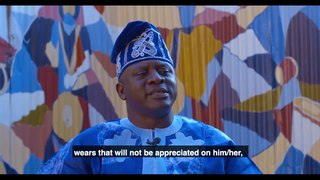
Ẹdẹ is a town in Osun State, southwestern Nigeria. It lies along the Osun River at a point on the railroad from Lagos, 180 kilometres (110 mi) southwest, and at the intersection of roads from Oshogbo, Ogbomosho, and Ile-Ife. The two (2) local government areas in Ẹdẹ are Ẹdẹ South and Ẹdẹ North. There are three (3) major tertiary institutions in Ẹdẹ, which makes the town one of the fastest growing towns in the south-west with an increasing literacy rate. The Federal Polytechnic Ẹdẹ, Adeleke University, and Redeemer's University are among the institutions.
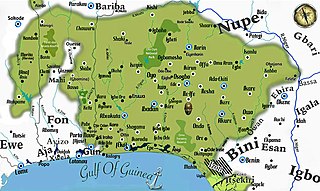
Yorubaland is the homeland and cultural region of the Yoruba people in West Africa. It spans the modern-day countries of Nigeria, Togo and Benin, and covers a total land area of 142,114 km2 or about 60% of the land area of Ghana. Of this land area, 106,016 km2 (74.6%) lies within Nigeria, 18.9% in Benin, and the remaining 6.5% is in Togo. Prior to European colonization, a portion of this area was known as Yoruba country. The geo-cultural space contains an estimated 55 million people, the majority of this population being ethnic Yorubas.
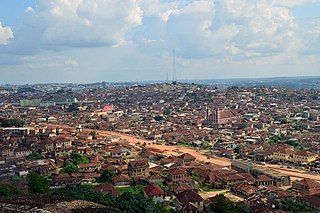
Ogun State is a state in southwestern Nigeria. Created on 3 February 1976 from the former Western State. Ogun State borders Lagos State to the south, Oyo State and Osun State to the north, Ondo State to the east, and the Republic of Benin to the west. Abeokuta is both Ogun State's capital and most populous city; other important cities in the state include Ijebu Ode, the royal capital of the Ijebu Kingdom, and Sagamu, Nigeria's leading kola nut grower. Ogun state is covered predominantly by rain forest and has wooden savanna in the northwest. Ogun State had a total population of 3,751,140 residents as of 2006, making Ogun State the 16th most populated state in Nigeria In terms of landmass, Ogun State is the 24th largest State in Nigeria with land area of 16,762 kilometer square.
Theonomy is a hypothetical Christian form of government in which society is ruled by divine law. Theonomists hold that divine law, particularly the judicial laws of the Old Testament, should be observed by modern societies.

Samuel Crowther, was a Yoruba linguist, clergyman, and the first African Anglican bishop of West Africa. Born in Osogun, he and his family were captured by slave raiders when he was about twelve years old. This took place during the Yoruba civil wars, notably the Owu wars of 1821–1829, where his village Osogun was sacked. Ajayi was later on resold to Portuguese slave dealers, where he was put on board to be transported to the New World through the Atlantic.

The Roman Catholic Diocese of Osogbo is a diocese located in the city of Osogbo, Osun State in the Ecclesiastical province of Ibadan in Nigeria.

The documented history begins when Oranyan came to rule the Oyo Empire, which became dominant in the early 17th century. The older traditions of the formerly dominant Ile-Ife kingdom are largely oral.
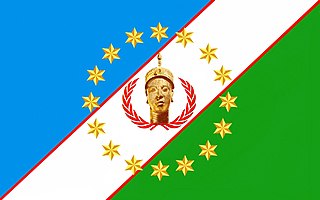
The Yoruba people are a West African ethnic group that mainly inhabit parts of Nigeria, Benin, and Togo. The areas of these countries primarily inhabited by the Yoruba are often collectively referred to as Yorubaland. The Yoruba constitute more than 52 million people in Africa, are over a million outside the continent, and bear further representation among members of the African diaspora. The vast majority of the Yoruba population is today within the country of Nigeria, where they make up 21% of the country's population according to CIA estimations, making them one of the largest ethnic groups in Africa. Most Yoruba people speak the Yoruba language, which is the Niger-Congo language with the largest number of native or L1 speakers.
The Rev. Dr. Solomon Adeniyi Babalola was a Nigerian Baptist pastor who lived and served in Nigeria, Ghana, Canada, and the United States. Born in Oke-Ila, Nigeria, he graduated from his initial pastoral training in December 1949 from the three-year theology course of the Nigerian Baptist Theological Seminary, Ogbomosho. He is reputed to be one of the two youngest Nigerian nationals ever recruited into the ministry by American missionaries, during a late-1940s drive led by Seminary President Dr. J.C. Pool, assisted by indigenous pastors. Babalola was consecrated as a Baptist trained pastor at the age of 20.
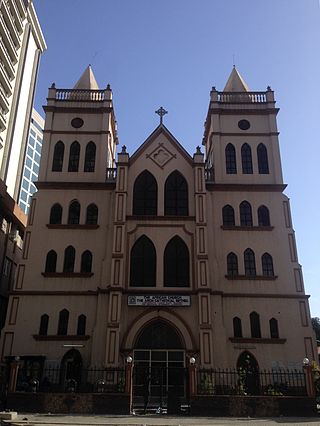
The African Church is a Christian denomination that was established in the British colonial areas that would later become Nigeria in 1901. It was established after strong disagreements arose between the European leadership of the Anglican Church and the native African leadership. Following the installation of Bishop Samuel Ajayi Crowther as the head of Church of Nigeria, a number of African clerics obtained progressive education that did not however translate to advancement in the leadership of the Church. This led to schisms that finally led to the formation of the indigenous African Church. African church hymn book Yoruba version Be published
Joseph Adebowale Atanda was a Nigerian native of Eruwa, in Oyo State, Nigeria. He obtained his B.A. (Hons) in History in 1964 from the University of London and a PhD. in history in 1967 from the University of Ibadan.
The Kiriji War, also known as the Ekiti–Parapo War, was a 16-year-long civil war between the subethnic kingdoms of the Yoruba people, specifically divided between the Western Yoruba, which was mainly the Ibadan and Oyo-speaking Yorubas, and the Eastern Yoruba, who were the Ekiti people, Ijesha, Ijebu people, and others.
The Anglican Province of Ondo is one of the 14 ecclesiastical provinces of the Church of Nigeria. It comprises 12 dioceses.
Odo Ere, popularly called Ere Gajo, is the headquarters of Yagba West Local Government Area, Kogi State, Nigeria. The town is located in the old Kabba Province about 140 kilometres southeast of Ilorin. The people of Odo Ere share a common ancestry with the Yoruba people in South-West Nigeria and they are often referred to as Okun Yoruba people. The town is situated on a well-watered savannah plain consisting of dotted hills, forest and grassland. The topography earned the town the sobriquet: Ere Ọmọ Onilẹ Dun Rin, meaning "Odo Ere town with a beautiful flat terrain that enhances ease of movement".
The Anglican Diocese of On the Coast is one of twelve within the Anglican Province of Ondo, itself one of 14 provinces within the Church of Nigeria: the current bishop is the Rt Rev. Seyi Pirisola.
Joseph Akinyele Omoyajowo was the Anglican Bishop of Ijebu in Province One of the Church of Nigeria from 1999 until his retirement in 2004.
References
- ↑ "PRESIDENTIAL ADDRESS DELIVERED AT THE THIRD SESSION OF THE SECOND SYNOD OF THE DIOCESE OF NSUKKA AT ST. PHILIP'S CHURCH EHA-A" (PDF). webcache.googleusercontent.com. Archived from the original (PDF) on 2022-05-29. Retrieved 2021-03-23.
- ↑ Arulefela, J. O (1988). Covenant in the Old Testament and in Yorubaland. Ibadan: Daystar Press. ISBN 978-978-122-203-0. OCLC 20230578.
- ↑ "Results for 'au:Arulefela, J. O.' [WorldCat.org]". www.worldcat.org. Retrieved 2021-03-27.